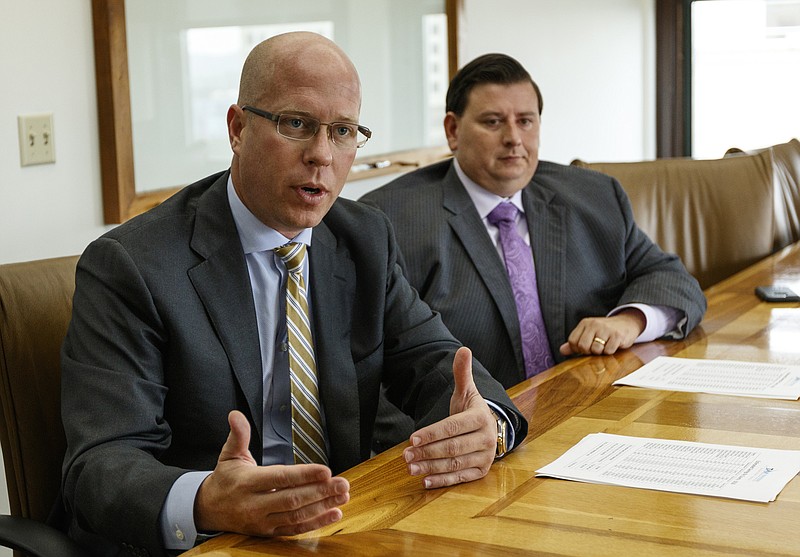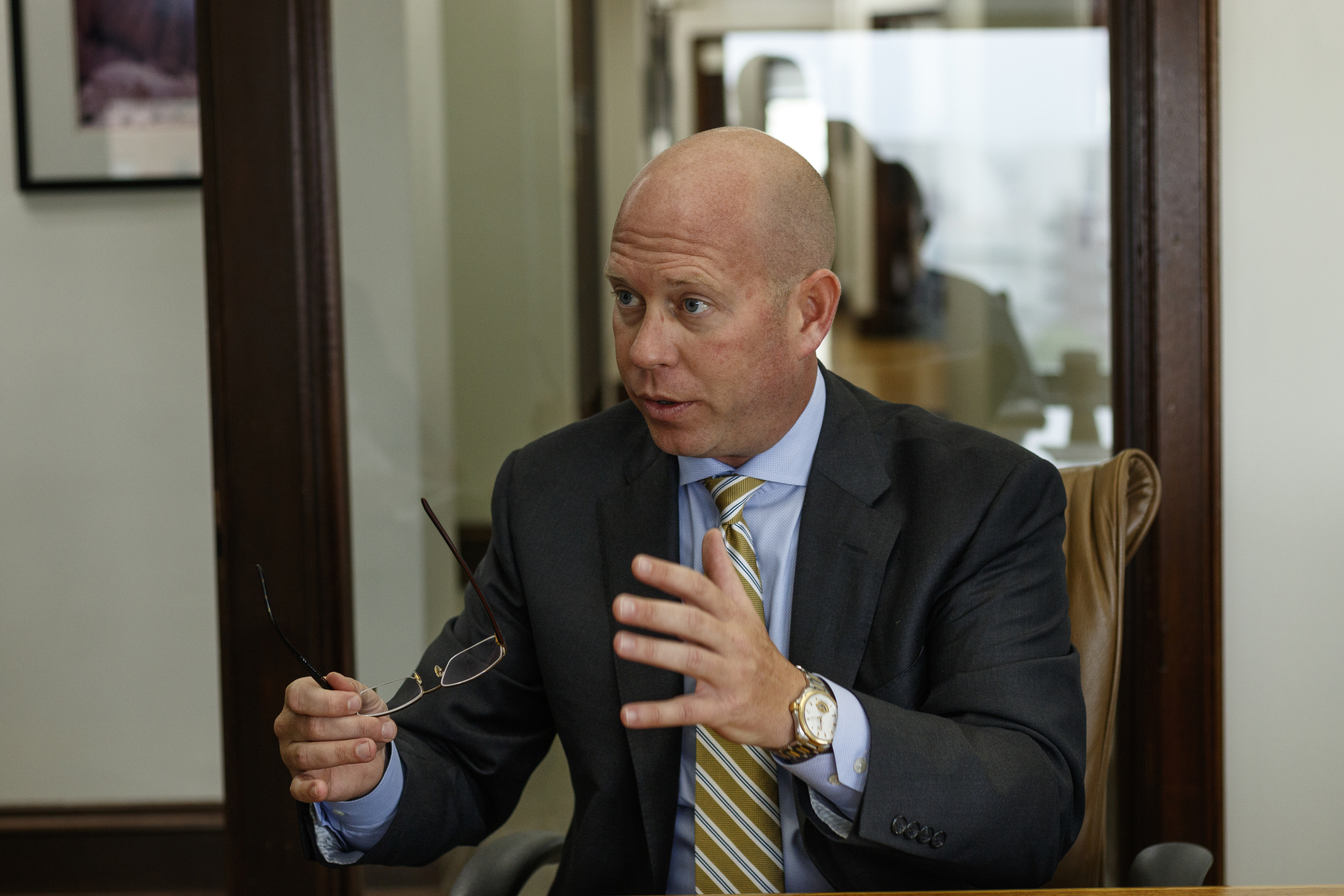When Andy Baggenstoss and Scott Cranmore first pitched their ankle bracelet monitoring and testing program to defense attorney Scott Kanavos in Cleveland, Tenn., Kanavos threw the pair out of his office.
"There are so many people in the criminal justice system with their hands out for money and I initially thought these guys were just trying to make money by putting what I saw as dog collars on human beings to exploit even my clients' private time," Kanavos said.
But after judges set relatively high bonds for some of his clients on cases that were not going to trial for months or even years, Kanavos realized that the only way some of those he was representing could get out of jail would be if they agreed to wear one of the ankle bracelets that Baggenstoss and Cranmore were using on many others facing criminal charges.
"It was at that point, I had this epiphany and I saw the wisdom of these devices," Kanavos said. "This can kind of be like a house arrest while those charged with a crime wait to go to trial or those convicted of non-violent crimes can be supervised and can keep working and seeing their family. I've had nothing but excellent experiences ever since I started working with (Baggenstoss and Cranmore)."
With overcrowded jails in much of the state, monitoring devices are proving to be an attractive, less expensive alternative to jail, especially for non-violent criminal suspects waiting to go to trial in local jails but unable to make bond. The monitoring devices, which not only tell where someone is but can also tell if a person has been using drugs or alcohol, cost only a fraction of the daily costs of keeping people locked up.
Monitoring monitors
› DUI monitors: Among 36,141 days where 411 DUI offenders wore the monitors last year, there were 127 violations, or a 99.6 percent compliance rate.› Domestic violence: Among 3,284 days where 57 domestic violence offenders were monitored last year, there were 10 violations, or a compliance rate of 99.8 percent.› Estimated savings: Among 139,496 days monitored by ankle bracelets last year, counties saved an estimated $7.3 million.Source: Tennessee Recovery & Monitoring. Results for April to December, 2016.
Baggenstoss and Cranmore organized Tennessee Recovery and Monitoring in 2012 to supplement the Cumberland Bail Bonds business that Baggenstoss had inherited from his father after his death in 2004. Baggenstoss, who has worked in the bail bonding business since he was in college at the University of Tennessee, saw the value of having ankle bracelets with GPS monitoring devices to keep track of where those waiting trial were going and if they improperly skipped town.
But Tennessee Recovery & Monitoring does far more than just keep track of where people are with its Scram One Piece GPS ankle bracelet monitoring. The company, which now operates in 72 counties in Tennessee with offices in Chattanooga, Cleveland, Memphis, Knoxville and Kingsport, Tenn., also works with local courts, jails and judges to install, monitor and control alcohol and drug usage with such equipment as SCRAMx, Transdermal Alcohol Monitoring, PharmChek drug patches and ignition interlock services.
Baggenstoss built his diverse bail bonding business into one of the biggest in Tennessee with operations in 71 of the state's 95 counties under a variety of different names, and he is quickly becoming the leading equipment distributor and monitoring company for ankle bracelets and other monitoring equipment across the state.
"What I saw five years ago is that we were missing the mark," Baggenstoss said. "There were people saying we need to do away with bail bonding. I don't believe that. I think the most violent offenders need a bail bondsman. But for many non-violent offenders, I don't think they need to go to jail. They need a monitor, they need a sanction; they need a drug screen; they need a home visit and interaction, and perhaps some treatment, whether it is AA or whether it is whatever mechanisms are out there."
Tennessee Recovery & Monitoring uses and is a distributor of Scram alcohol monitoring devices that give courts, police and others the tools to continuously check on alcohol or drug abuse and thereby change behaviors for higher-risk alcohol clients.
The devices use transdermal alcohol monitoring to determine if a suspect or inmate in the program has been drinking. Alcohol is first absorbed into the bloodstream through the stomach and small intestines and is then metabolized in the liver or released through breath, urine and through the skin as sweat. That's how the scram cam tests for alcohol consumption.
Last year alone, Baggenstoss estimates the monitors saved more than $7.3 million in jail costs in Tennessee by monitoring people for 139,496 days. The program cost participating counties a total of only $47,394, since the ankle bracelets are either paid for by the user or from a state indigent fund that pays $10 a day.
In Grundy County near where Baggenstoss grew up on Monteagle Mountain, Sheriff Clint Shrum used Tennessee Recovery and Monitoring to monitor 12,514 days by criminal suspects or convicts, saving the county an estimated $162,682.
Baggenstoss admits the devices are not always popular with his peers in the bail bonding industry who see the devices as competition, and some judges and sheriffs worry that the ankle bracelets are not always effective in deterring people from committing other crimes. There have been instances in which those awaiting trial have broken the ankle bracelets and escaped or violated the bans on drinking or drug use.
But the compliance rate among DUI offenders with the bracelets last year was 99.6 percent with only 127 violations out of 36,191 monitored days, according to data compiled by the company. Among those monitored for domestic violence charges or offenses from April to December 2016, only 10 violations resulted from 3,284 monitored days.
"We think we're part of a paradigm shift from incarcerating everybody," said Cranmore, vice president for Tennessee Recovery & Monitoring. "Some people need another opportunity, and these monitors provide another opportunity and the recovery people need."
Baggenstoss said the ankle bracelet charge of $10 a day under the state's indigent fund for those who can't afford to pay for the devices "is still a fraction of the cost of incarceration," which he estimates is now about $63 a day in the typical county jail.
The company also provides regular check-ins and personal talks with those on monitors for drug and alcohol abuse. Baggenstoss argues that having suspects or non-violent criminals out and working, seeing their families and checking in with monitors is better, in many instances, that having such persons locked up in jail "where they often learn more criminal behavior and how to get more drugs" from their fellow prisoners.
"It's not a silver bullet solution," he said. "But incarceration doesn't work for everybody and we need something different and my believe is that should come from the private sector especially when it deals with recovery and treatment."
Baggenstoss, whose father and grandfather were both entrepreneurs running a bakery, a truck stop, a bail bonding business and other ventures, also believes in private enterprise as the most effective means of running such programs.
"If we can do treatment and recovery through private enterprise, that's what I am all about," he said. "I wanted to carry on the legacy of my father, and I wanted to help other people, which we certainly do. But we also want to be different. My father did lots of different things, but I wanted to be great at one thing."
Contact Dave Flessner at dflessner@timesfreepress.com or at 423-757-6340.

